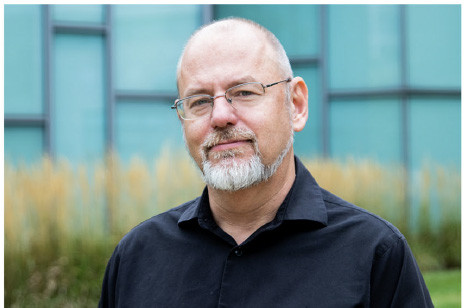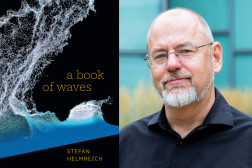Biography
Stefan Helmreich is an anthropologist who studies how scientists in oceanography, biology, acoustics, and computer science define and theorize their objects of study, particularly as these objects — waves, life, sound, code — reach their conceptual limits. A Book of Waves (Duke University Press, 2023) details how scientists at sea and in the lab monitor and model ocean waves, seeking to capture in technical language these forces of nature at once periodic and irreversible, wild and pacific, ephemeral and eternal. The book includes reflections on waves in mythology, surf culture, feminist and queer theory, film, Indigenous Pacific activisms, Black Atlantic history, and cosmology. Helmreich’s previous ethnography, Alien Ocean: Anthropological Voyages in Microbial Seas (University of California Press, 2009), is a study of marine biologists working in realms usually out of sight and reach: the microscopic world, the deep sea, and oceans outside national sovereignty. Winner of the 2017 J.I. Staley Prize from the School of Advanced Research, the 2012 Rachel Carson Book Prize from the Society for Social Studies of Science, the 2010 Senior Book Prize from the American Ethnological Society, and the 2010 Gregory Bateson Book Prize from Society for Cultural Anthropology, the book charts how marine microbes are entangled with debates about the origin of life, climate change, property in the ocean commons, and the possibility of life on other worlds. An earlier book, Silicon Second Nature: Culturing Artificial Life in a Digital World (University of California Press, 1998) is an ethnography of computer modeling in the life sciences. It won the 2000 Diana Forsythe Book Prize from the American Anthropological Association. Sounding the Limits of Life: Essays in the Anthropology of Biology and Beyond (Princeton University Press, 2016) is a collection of essays that asks after changing definitions of life, water, and sound (and features a soundtrack) and won the 2016 Michelle Kendrick Book Prize from the Society for Literature, Science & the Arts. What Is Life?, co-edited with Natasha Myers, Sophia Roosth, and Michael Rossi, is an art+science book that reproduces pages from key texts in the history of biology, interleaving these with essays that ask what the category of “life” has meant to biologists. Helmreich received his PhD in Anthropology from Stanford University and prior to coming to MIT held postdoctoral fellowships at Cornell, Rutgers, and NYU. In 2018, he received a Guggenheim Fellowship. His essays have appeared in Critical Inquiry, Representations, American Anthropologist, Cabinet, The Wire, Women’s Studies Quarterly, and Public Culture.
Research
anthropology of science and technology, with an emphasis on biology; social studies of race, gender, kinship, sexuality, ability and science; ethnography of information science; maritime and oceanic anthropology; multispecies ethnography; social and cultural studies of sound and the senses
Selected Publications
| 2023 | A Book of Waves. Durham, NC: Duke University Press. |
| 2022 | What Is Life? Biogroop (Stefan Helmreich, Natasha Myers, Sophia Roosth, and Michael Rossi), eds. in association with Katrin Klingan und Nick Houde. Das Neue Alphabet (The New Alphabet), Volume 11. Leipzig: Spector Books. In English and German editions: https://www.hkw.de/en/programm/projekte/2021/das_neue_alphabet_publikationsreihe/das_neue_alphabet_titel/publikation_what_is_life_das_neue_alphabet.php. |
| 2021 | On Oceanography: Armen Avanessian, Werner Boschmann, and Karen Sarkisov in dialogue with Stefan Helmreich. In XXI Century Science: Oceanography: Marine Monitoring, Microbiology, and Materiality. Armen Avanessian, Werner Boschmann, and Karen Sarkisov, eds. Pp. 7-21. Berlin: Sternberg Press. |
| 2021 | Flipping the Ship: Ocean Waves, Media Orientations, and Objectivity at Sea. Media and Environment, May. https://doi.org/10.1525/001c.21389. |
| 2020 | The Shape of Epidemics (with David Shumway Jones). Boston Review, June 26, http://bostonreview.net/science-nature/david-s-jones-stefan-helmreich-shape-epidemics |
| 2020 | Wave Theory ~ Social Theory. Public Culture 32(2):287-325 |
| 2017 | The Genders of Waves. WSQ: Women's Studies Quarterly 45(1&2): 29-51. |
| 2016 | Sounding the Limits of Life: Essays in the Anthropology of Biology and Beyond, with co-authored contributions from Sophia Roosth and Michelle Friedner. Princeton: Princeton University Press. eBook features color images. Audio/music examples at https://soundcloud.com/user-671277267/sets/sounding-the-limits-of-life-essays-in-the-anthropology-of-biology-and-beyond. |
| 2016 | Gravity's Reverb: Listening to Space-Time, or Articulating the Sounds of Gravitational-Wave Detection. Cultural Anthropology 31(4): 464-492. |
| 2014 | Homo microbis: The Human Microbiome, Figural, Literal, Political. Thresholds 42: 52-59. |
| 2014 | The Perils and Promises of Microbial Abundance: Novel Natures and Model Ecosystems, from Artisanal Cheese to Alien Seas (with Heather Paxson). Social Studies of Science 44(2):165-193. |
| 2013 | Potential Energy and the Body Electric: Cardiac Waves, Brain Waves, and the Making of Quantities into Qualities. Cultural Anthropology 54, Supplement 7: 139-148. |
| 2012 | Sound Studies Meets Deaf Studies (with Michele Friedner). The Senses & Society 7(1):72-86. |
| 2011 | From Spaceship Earth to Google Ocean: Planetary Icons, Indexes, and Infrastructures. In "Image as Action, Image in Action," special issue of Social Research 78(4):1211-1242. |
| 2011 | What Was Life? Answers from Three Limit Biologies. Critical Inquiry 37(4):671-696. |
| 2011 | Nature/Culture/Seawater. American Anthropologist 113(1):132-144. |
| 2010 | The Emergence of Multispecies Ethnography (with S. Eben Kirksey, co-editor of special issue on "Multispecies Ethnography"). Cultural Anthropology 25(4):545-575. |
| 2010 | Life Forms: A Keyword Entry (with Sophia Roosth). Representations 112:27-53. |
| 2009 | Alien Ocean: Anthropological Voyages in Microbial Seas. Berkeley: University of California Press. |
Teaching
21A.859J / STS.250J
Social Theory and Analysis
Major theorists and theoretical schools since the late 19th century. Marx, Weber, Durkheim, Bourdieu, Levi-Strauss, Geertz, Foucault, Gramsci, and others. Key terms, concepts, and debates.
21A.319J / STS.330J
History and Anthropology of Medicine and Biology
Co-taught with Dr. David Jones.
Explores recent historical and anthropological approaches to the study of medicine and biology. Topics might include interaction of disease and society; science, colonialism, and international health; impact of new technologies on medicine and the life sciences; neuroscience and psychiatry; race, biology and medicine. Specific emphasis varies from year to year.
21A.103J / STS.046J / WGS.225J
The Science of Race, Sex, and Gender
Co-taught with Dr. Abha Sur.
Examines the role of science and medicine in the origins and evolution of the concepts of race, sex, and gender from the 17th century to the present. Focus on how biological, anthropological, and medical concepts intersect with social, cultural, and political ideas about racial, sexual, and gender difference in the US and globally. Approach is historical and comparative across disciplines emphasizing the different modes of explanation and use of evidence in each field.
21A.505J / STS.065J
The Anthropology of Sound
Examines the ways humans experience sound and how perceptions and technologies of sound emerge from cultural, economic, and historical worlds. Consider how the sound/noise boundary has been imagined, created, and modeled across sociocultural and scientific contexts. Learn how environmental, linguistic, and musical sounds are construed cross-culturally as well as the rise of telephony, architectural acoustics, sound recording, and the globalized travel of these technologies. Questions of sound ownership, property, authorship, and copyright in the digital age are also addressed.
21A.507J / 4.648J (meets with 21A.519/4.649)
Resonance: Sonic Experience, Science, and Art
Examines the sonic phenomena and experiences that motivate scientific, humanistic, and artistic practices. Explores the aesthetic and technical aspects of how we hear: measure or describe vibrations; record, compress, and distribute resonating materials; and how we ascertain what we know about the world through sound. Although the focus is on sound as an aesthetic, social, and scientific object, the subject also investigates how resonance is used in the analysis of acoustics, architecture, and music theory. Students make a sonic artifact or research project as a final requirement. Students taking graduate version complete additional assignments. Co-taught with Professor Caroline Jones.
21A.504J / STS.086J / WGS.276J
Cultures of Computing
Examines computers anthropologically, as artifacts revealing the social orders and cultural practices that create them. Students read classic texts in computer science along with cultural analyses of computing history and contemporary configurations. Explores the history of automata, automation and capitalist manufacturing; cybernetics and WWII operations research; artificial intelligence and gendered subjectivity; robots, cyborgs, and artificial life; creation and commoditization of the personal computer; the growth of the Internet as a military, academic, and commercial project; hackers and gamers; technobodies and virtual sociality. Emphasis is placed on how ideas about gender and other social differences shape labor practices, models of cognition, hacking culture, and social media.
Awards
| 2018-19 | John Simon Guggenheim Foundation Fellowship. |
| 2018-19 | Katherine Hampson Bessell Fellowship, Radcliffe Institute for Advanced Study, Harvard University, Cambridge, MA. |
| 2017 | J.I. Staley Prize, School for Advanced Research, for Alien Ocean |
| 2016 | Michelle Kendrick Book Prize, Society for Literature, Science & the Arts, for Sounding the Limits of Life |
| 2016 | Frank E. Perkins Award for Excellence in Graduate Advising, MIT |
| 2012 | Rachel Carson Book Prize, Society for the Social Studies of Science, for Alien Ocean |
| 2010 | American Ethnological Society Senior Book Prize, American Anthropological Association, for Alien Ocean |
| 2010 | Gregory Bateson Book Prize, Society for Cultural Anthropology, American Anthropological Association, for Alien Ocean |
| 2010 | Institute for Advanced Studies Distinguished Fellowship, Durham University, and Prowse Fellowship, Van Mildert College, Durham, United Kingdom |
| 2009 | Andrew W. Mellon Foundation Grant to fund a 2010-2011 Sawyer Seminar on the Comparative Study of Cultures entitled "Sensing the Unseen"(with Heather Paxson) |
| 2009 | James A. and Ruth Levitan Award for Excellence in Teaching in the School of Humanities, Arts, and Social Sciences, MIT |
| 2006 | MIT's James A. and Ruth Levitan Research Prize in the Humanities |
News
Stefan Helmreich’s new book examines the many facets of oceanic wave science and the propagation of wave theory into other areas of life.
Peter Dizikes | MIT News
August 30, 2023
Flipping the Ship: Ocean Waves, Media Orientations, and Objectivity at Sea
Stefan Helmreich | Media+Environment | Image: Stefan Helmreich
June 11, 2021
Teaching With Digital Technology Award winners recognized for their innovations
MIT Open Learning
August 3, 2020
Perspectives on the Societal Impact of Computing and AI
February 27, 2019
Links
Lecture video: “From A Book of Waves: Ocean Waves, Ocean Science, Ocean Media,” 2023 onward
Lecture Video: "From A Book of Waves: Waves Dangerous, Domesticated, Diagnostic," 2023 onward
Lecture video: “Underwater Music.” Ocean Memory Project Sound Workshop, online, 2021
Lecture video: Life at Sea: Alien Ocean. University of Bremen, 2016
Music and sound megamix: “Wave Count,” with musicologist Wayne Marshall. The Wire Mix, 2019





